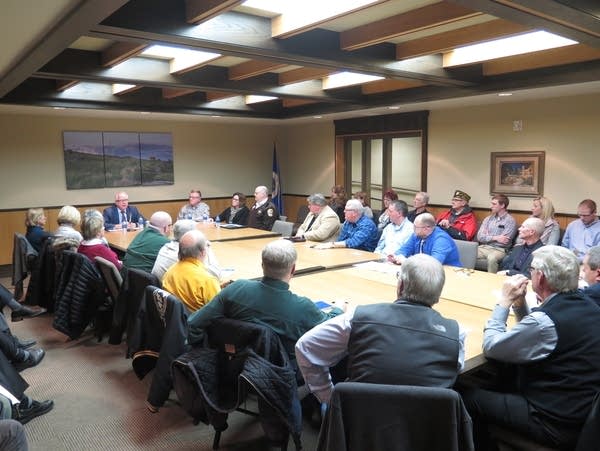Walz hears varying takes on 'One Minnesota' tour

Go Deeper.
Create an account or log in to save stories.
Like this?
Thanks for liking this story! We have added it to a list of your favorite stories.
In successive days last week, Gov.-elect Tim Walz listened as constituents voiced concerns about guns.
In Luverne, a gun owner wanted clarity about how firearms restrictions embraced by the Democrat would line up with the Second Amendment. In Minneapolis, the undertone was whether curbs would go far enough to address gun violence.
It was a small taste of the challenge Walz will face converting his "One Minnesota" campaign theme into reality.
A month after he was elected and a month before he takes his oath, Walz and Lt. Gov-elect Peggy Flanagan have completed a listening tour with 24 stops, in every corner of the state. They invited people to do more than just vent, but also step up to apply for key administration positions or hundreds of openings on state commissions and boards.
Turn Up Your Support
MPR News helps you turn down the noise and build shared understanding. Turn up your support for this public resource and keep trusted journalism accessible to all.
They called it their "One Minnesota" tour.
"That's not just a campaign theme," Walz said in one of the early stops. "That's a way to see world and it's a way we want to govern together."
The message was a central part of the Walz campaign, which resulted in an 11-point win over Republican Jeff Johnson. But some still aren't sure what it means.
"I think it's a nice campaign slogan. I think it's a nice tagline. But we have such a diverse set of interests around the state," said state Rep. Ron Kresha, a Republican elected last month to his fourth term in a Little Falls-area district. "I'd like to see what it actually means in practice."
Despite his convincing victory, Walz carried only 21 of the state's 87 counties. And Republican legislators continue to dominate rural-area districts.
Several of the Walz listening sessions were in places where Walz lost, which he says reinforces the point that he'll seek ideas from and solutions for people whether they backed him or not.
In the two dozen stops, people took advantage of the open-mic format to raise issues vital to them — from bad roads and strained schools in southern Minnesota to public safety tensions and health disparities in urban communities.
It's not just a rural-urban divide either. There are differences rooted in gender, ethnicity and economic status.
Walz isn't saying that one size will fit all.
"I'm not naive. 'One Minnesota' doesn't mean we're all the same," he told one audience. "It means we simply find ways to work together across lines of differences to get the results we want to see. There is strength to differing opinions. There is strength in not having one single approach to something."
He has been encouraging people to understand both the problems and contributions of their sometimes-distant Minnesota neighbors.
Walz said there are enough overlapping priorities — from propping up schools to improving health care access to upgrading highways — to unite Minnesota.
"Those are common Minnesota values," Walz said.
Kresha said says Walz has work to do to convince rural Minnesota residents and officials that his policies will pay off for them.
"A slogan like 'One Minnesota' sounds great in a short soundbite. But the reality is if you are talking at us and saying this is a policy you're going to like and we're going to send it to you," Kresha said. "It's much different than asking, which policies are going to be beneficial to bringing workers, building small businesses and economic development infrastructure to your area?"
Kresha said he hopes Walz will seek that input early on, perhaps over coffee with Republican lawmakers like him.
During his recent swing, Walz let others do most of the talking.
In Luverne, local officials said state regulations were crimping child care programs, making it hard for some parents to find caregivers during work hours. A school leader expressed frustration about being able to offer pre-kindergarten programs when classroom space is already tight. A law enforcement representative raised concern about loosening laws around marijuana use.
In north Minneapolis, comments and questions touched on ensuring availability of contraception, helping reintegrate after jail or prison time, making government itself more diverse and promoting clean energy technology.
Community organizer John Thompson pressed Walz for more than just lip service when it comes to racial inequities and gun violence.
"My community is allergic to bullets. My community is allergic to bullets from black-on-black crime to bullets coming out of police officers' guns. My community is allergic to the judicial system," Thompson said. "We gathered a lot of people to the polls to vote for you and Peggy because we felt like you were the antibiotic for the stuff we are allergic to in our community. And I believe in you."
Walz told Thompson and others in the overflow crowd to hold him accountable for addressing the concerns.
"I need to make this case as a rural white man that they impact all of us in this state. They are impacting the quality of life for all of us both economically and morally," he said. "We are better than that. And sometimes it takes me to be able to walk through that VFW in Sleepy Eye and tell them, 'This is why this mass incarceration piece needs to be dealt with and here's how it's going to impact your tax dollars. Here's how it's going to impact your communities.'"
MPR News reporter Mark Steil contributed to this report.


